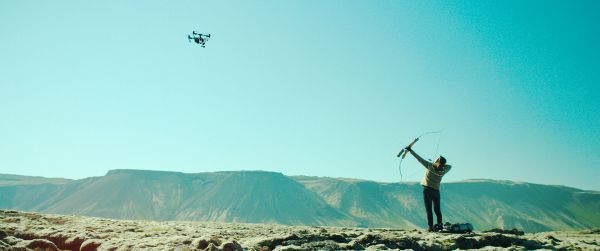Eye For Film >> Movies >> Woman At War (2018) Film Review
Woman At War
Reviewed by: Andrew Robertson

Woman at War is probably the only likely contender to displace Sorry To Bother You as my favourite science fiction film of the last year. "but that's not science fiction", you might say, and if your definition does not include The Hunt For Red October then you'd be wrong. This is possibly technically a technothriller because it's got a President in it, but I don't know how else you would classify a film where a woman of a certain age uses a bow and arrow to deter multinational corporations from damaging the countryside. Other than good, which Woman at War is.
Halldóra Geirharðsdóttir is Halla, disrupting the flow of electricity to Iceland's aluminium smelters. There's more to it than that - a lot more - but that's enough to hang your interest on. She's an Amazon, one bared breast in the form of a pin-badge, perhaps more Miss Jean Brodie than Wonder Woman, but as fearsome as either, both. It's a brilliant performance in a film that requires much of her physically - I was minded of a short, Lin, that I saw almost a decade ago, as pure an intersection of performance and landscape(s) as this, but this is a different place, a different journey.

One beautifully accompanied by its score, not just diegetic but explicitly anthropogenic - a band whose interactions with the action extend to exerting (remote) control, a chorus in Ukrainian national dress, a sousaphone in the stunning surrounds, a piano that becomes key to the action.
This is taut stuff - tactical infra-red evasion, the proximity of Icelandic kin (as seen in Jar City) manifest not just in DNA but 'alleged cousins', paranoia about internet connections, foreign delagations, the CIA, conspiracy, conspiracy theories, and black helicopters and drone surveillance. There's a history lesson that adds import to a beautifully constructed shot (another bit of drone) that draws strength and signal from strength of signal.
There's pamphleteering, ashram yoga, tai'chi, terrorism. Mandela features heavily, and I'll do the film the credit of knowing that his own career involved attacks on pylons - economic disruption. The Mountain Woman's legacy is similarly complex, even as Iceland outsources its counter-espionage (in part in fear of being sued for not doing so) Halla's hopes for allies grow more complicated.
Yet to focus on her direct action is to miss another part of this, her efforts to adopt - a little girl, Nika, four years old, Halla is too old to adopt most anywhere but not in Ukraine. These parallel goals - saving a person, saving the planet - are the choir and the band. It might seem funny - indeed, it is - but it's beautiful, beautifully done too. Indeed, everything, from the hapless tourist caught in counter-terror trawl to the composure and compositions of choir and chorus to the choreography of cowering clock- and counter-clock-wise around a cairn to avoid capture by 'copter coppers.
This is joyful, beautiful, up-lifting - and bleak too, a clarion call to direct climate action at the personal and the political levels. There's a power to it that by the end will wash you away, a swell, a surge of emotion. Water will erode the stone, in torrents as scour, in glacial melt, a drop at a time. Water is power, hydroelectric is "hydraulic power", not to be confused with Dune's hydraulic despotism nor that of the Immortan Joe. The pylons here hold different monsters than those of Trollhunter, but they stand no less tall.
This is a second feature for writer/director Benedikt Erlingsson, 2013's Of Horses And Men won a raft of prizes at various festivals and this film too deserves plaudits and plunder. If it has a weakness (and it's uncertain if it is one) it's that its ending shades towards an optimism and reward that puts gold at the end of the rainbow rather than radiation of a certain stripe and inescapable physics. Yet even there it saves itself with a coda where things are literally carried away - water has a power of its own, after all.
Eye For Film saw it at Glasgow's 2019 Film Festival. Festival co-director Allison Gardiner has said it would be coming back to the GFT later this year, which is excellent news. The 2018 Festival was disrupted by the 'Beast From The East' which paralysed transport across Scotland with ice and snow, and the 2019 Film Festival has seen theatre radiators, large crowds and unseasonal balm combine to force audiences to shuck their coats in queues - weather is not climate, but extreme weather is a consequence. If circumstances allow (and goodness knows they might not), see this film.
Reviewed on: 24 Feb 2019
















